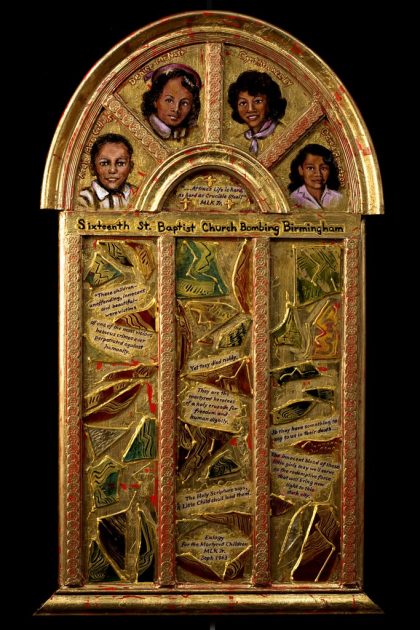On Sunday morning, September 15, 1963 at the Sixteenth Street Baptist Church in Birmingham, Alabama, Addie Mae Collins (14), Denise McNair (12), Carole Robertson (14), and Cynthia Wesley (14) were in their best Sunday School dresses as they prepared to go upstairs to assist with the special “Youth Sunday” worship service. They were talking excitedly about their first day at school when suddenly an explosion rocked the church building. The four little girls were killed instantly.
Since its construction in 1911, the Sixteenth Street Baptist Church had served as the center of life for the African American community of Birmingham. In the spring of 1963, hundreds of school children had been brave enough to form a “children’s crusade” risking arrest and walking fearlessly into the fire hoses and police dogs of the notorious Police Commissioner, Bull Connor. Because it had been a gathering place for those campaigning against segregation, the church became a target of the Ku Klux Klan. Fourteen years after the explosion, one of the four Klansmen responsible for setting the bomb, was found guilty of murder.
Not only had the explosion blown open a gaping hole in the foundation with flying debris mortally wounding Addie Mae, Denise, Carole and Cynthia, but plaster from the sanctuary ceiling fell upon those gathering for worship. Historic stained glass windows were shattered. In all, more than 20 people had to be hospitalized. One of the injured was Addie Mae’s sister, Sarah, who was blinded in one eye. Amazingly, the image of Jesus’ face was knocked cleanly out of the only surviving stained glass window in the church’s east wall.
Having given his “I Have a Dream” speech to the largest civil rights gathering in the nation’s capital just 18 days earlier, Rev. Martin Luther King now spoke quietly to the thousands who gathered at the damaged church for the joint funeral service for three of the girls (one of the girls was memorialized in a private service). He spoke of life being “as hard as crucible steel”.He reminded the 8,000 mourners that “God still has a way of wringing good out of evil…The innocent blood of these little girls may well serve as the redemptive force that will bring new light to this dark city…Indeed, this tragic event may cause the white South to come to terms with its conscience.”
Once again, national attention was drawn to the evil of racism. The bombing of the church and the killing of the girls led to an intensive voting rights campaign throughout the South and Federal Civil Rights legislation in subsequent years.

